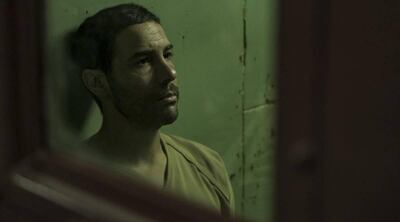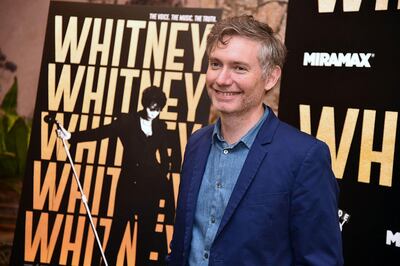When Scottish filmmaker Kevin Macdonald first read Guantanamo Diaries, he couldn't see it as a movie. Mohamedou Ould Slahi's account of his imprisonment in the notorious US detainee camp, which was published in 2015, was a shocking read – it was written during his 14-year incarceration at Guantanamo Bay, where he was held without charge. Macdonald, whose body of work includes the Oscar-winning documentary One Day in September, was "fascinated", but unable to visualise it as a film.
However, when he spoke over Skype to Slahi at his home in Mauritania, everything changed. “That’s what made me want to make a film,” he says. “I was motivated by him and his character. Because I expected him to be very angry, embittered and vengeful. And he was not.” He discovered Slahi to be cultured, funny, sophisticated and “incredibly empathetic” above all else. “I thought this man is really interesting as a personality – I want to make a movie about that.”
The result is The Mauritanian, a harrowing account of Slahi's incarceration in the prison, where he was subjected to unimaginably cruel physical and mental torture. The film is in UAE cinemas from today, and is also being screened at the Berlin International Film Festival next week.
Slahi is played by French-Algerian actor Tahar Rahim, who is best known for his role in Jacques Audiard's A Prophet. He stars opposite Jodie Foster, who plays Nancy Hollander, the criminal defence lawyer who worked tirelessly on Slahi's behalf. Benedict Cumberbatch, whose production company SunnyMarch is behind the film, co-stars.
Slahi had initially been suspected of connections to a planned bombing of LAX airport in 2000, part of the so-called Millennium Plot, but as he repeatedly told interrogators, he had severed all ties with extremist group Al Qaeda in 1992. The film doesn't hold back in showing what Slahi endured – sleep deprivation, extreme noise, threats to his family, forced sexual assault; terrors that the late author John le Carre described as a "vision of hell, beyond Orwell, beyond Kafka", after reading the book.
Rahim, who has been nominated for a Golden Globe for his performance, wanted to make sure he conveyed this as convincingly as possible. “The only way I found to make it real is to, in a way, experience it,” he says. “I wanted real shackles, I want to be waterboarded for real, force-fed for real. I asked them to make the cell very cold. So I could feel exactly what Mohamedou has been through. Otherwise, I wouldn’t have been able to do it.”
Macdonald is quick to point out that the film has no human villain. "The system is the villain," he says. "I thought it was interesting in this era of great division to have a film that is not vilifying either side."
One of the key characters is Cumberbatch's Lt Col Stuart Couch, the Republican and Christian prosecuting lawyer who comes to realise Slahi's treatment is unconstitutional. "He was heroic in a way; he was the one who almost had to do more than Nancy did in order to stand up against the tide of what the government was trying to do."
Intriguingly, the film arrives at a crucial time – with increased calls to close Guantanamo Bay. At the end of last month, Slahi was one of six former Guantanamo detainees who wrote an open letter, published in the New York Review of Books, urging the newly sworn-in US President Joe Biden to close the prison for good. "President Bush opened it," they wrote. "President Obama promised to close it, but failed to do so. President Trump promised to keep it open. It is now your turn to shape your legacy with regards to Guantanamo."
Barack Obama’s campaign promise in 2008 to shut the facility was never realised. “Obama came into office, wanting to close Guantanamo, with all the right intentions, but found it incredibly difficult,” says Macdonald. “And then he had to make a decision. How much political capital do I want to spend on this issue? It wasn’t popular, even with the Democratic Party, his idea of closing the prison and distributing some of the detainees around American jails – his politicians did not really want these guys turning up in their jails.”
Macdonald wanted to show that Obama's administration was not entirely blameless in the fate of Slahi. In March 2010, a federal judge ruled that the US could not continue to detain Slahi, concluding that there was no credible evidence that he was part of Al Qaeda. And yet Slahi remained in prison for a further six and a half years, after the government opposed his release and filed an appeal in the DC Circuit. He was eventually freed in October 2016, after it was determined that he posed no significant threat to the US.

Shortly after Slahi’s release, Trump came to power, promising to keep Guantanamo open, and in 2018, signed an executive order to make good on that.
Even now 40 prisoners remain inside the detainee camp, and yet the signs are positive that Guantanamo will finally be closed. Recently, when asked at a press briefing if the prison would be closed by the time Biden leaves office, White House press secretary Jen Psaki said: "That's certainly our goal and our intention."
Macdonald says: “I think Biden can close it, but of course, they’ve made a terrible rod for their own backs.” Of the 40 prisoners that remain, he says: “Some of those people, at least, are people responsible for really terrible terrorist attacks, but they have not been able to prosecute them, because most of the evidence that they have was gained under torture. So they’re in this terrible limbo.”
Certainly, it leaves the American government in a precarious position – and the hope is that a film like The Mauritanian will only add to the discourse over the coming months. The pressure is now on Biden to deliver, however difficult that may be. As Slahi and his co-authors note in their open letter: "We believe you can close Guantanamo before its looming twentieth anniversary."
The Mauritanian is in UAE cinemas today










